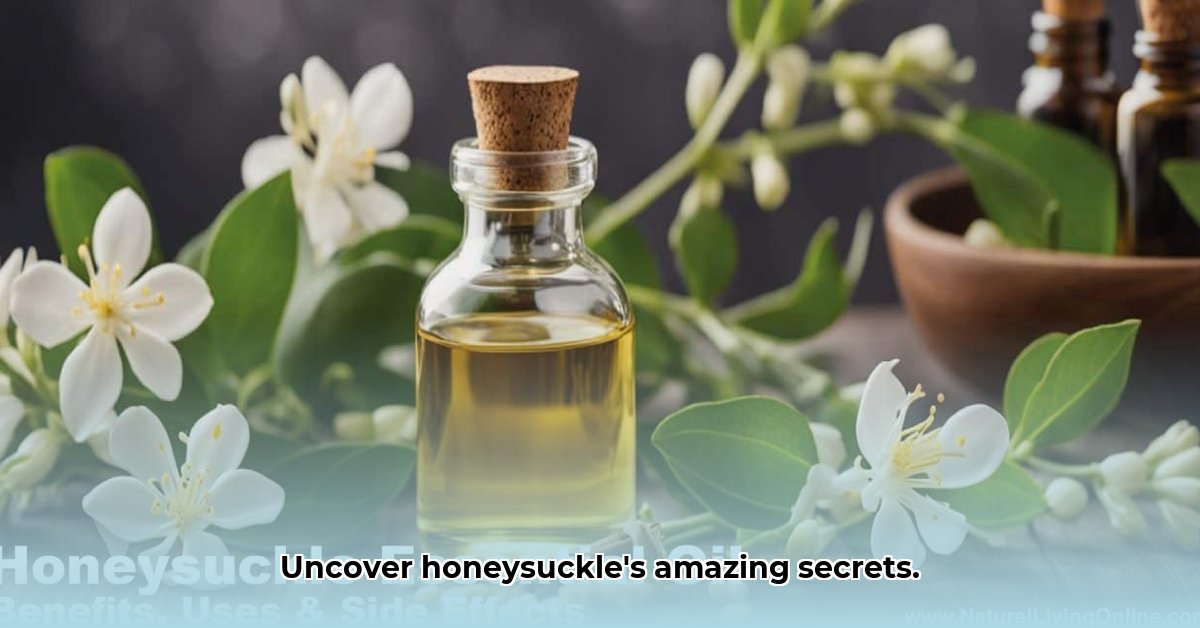
Understanding Honeysuckle Essential Oil
Honeysuckle, with its captivating fragrance, offers more than just a pleasant scent. Honeysuckle essential oil, derived from various Lonicera species, is gaining popularity for its purported health benefits. However, it's crucial to approach these claims with a balanced perspective, acknowledging the limitations of current scientific evidence. This comprehensive guide will explore the potential benefits, safe usage, and necessary precautions associated with honeysuckle essential oil.
Chemical Composition and Properties
The therapeutic properties of honeysuckle essential oil are attributed to its complex chemical composition. Key components include quercetin and chlorogenic acid, both known for their antioxidant and anti-inflammatory properties. Quercetin (a flavonoid) helps protect cells from damage caused by free radicals, while chlorogenic acid (a polyphenol) contributes to its anti-inflammatory potential. [1] However, it's important to note that the exact composition can vary based on the honeysuckle species and extraction methods, impacting the consistency of the oil's effects. Further research is needed to fully elucidate the synergistic effects of these compounds within the oil.
Potential Benefits and Uses
While anecdotal evidence and some studies suggest various benefits, the level of scientific support varies greatly.
Benefits with Some Scientific Support:
- Aromatherapy for Relaxation: The sweet, floral aroma of honeysuckle oil is widely recognized for its calming and relaxing effects. Inhaling the scent can promote a sense of well-being and stress reduction. This effect is supported by the established principles of aromatherapy.
- Potential Anti-inflammatory Properties: Laboratory studies and some pre-clinical research suggest quercetin and chlorogenic acid exhibit anti-inflammatory activity. [1] This may translate to potential benefits for minor skin irritations. However, more robust human clinical trials are necessary to confirm these effects in humans.
Claims Requiring Further Research:
Many proponents claim honeysuckle oil can alleviate headaches, digestive issues, or other specific health problems. However, substantial scientific evidence supporting these claims is currently lacking. While anecdotal reports exist, rigorous clinical trials are needed to validate these purported benefits.
Instructional Guide: Safe and Effective Use
Always prioritize safety when using honeysuckle essential oil. Follow these steps for safe and effective application:
Patch Test: Before applying the oil extensively, perform a patch test. Dilute a small amount with a carrier oil (see step 2) and apply it to a small, inconspicuous area of skin. Wait 24 hours to observe any reactions (redness, itching, etc.). Skip using the oil if any adverse reaction occurs.
Dilution: Never apply honeysuckle essential oil directly to the skin. Always dilute it with a carrier oil like jojoba, sweet almond, or fractionated coconut oil. A typical dilution ratio is 1-3% (e.g., 3-9 drops of essential oil per ounce of carrier oil).
Aromatherapy: For aromatherapy, add a few drops to a diffuser. Ensure proper ventilation to avoid potential respiratory irritation.
Topical Application: Apply diluted oil gently to the skin, avoiding contact with eyes and mucous membranes.
Proper Storage: Store the oil in a tightly sealed, dark-colored glass bottle in a cool, dry place, away from direct sunlight and heat.
Contraindications: Avoid using honeysuckle essential oil if you are pregnant, breastfeeding, or have known allergies to honeysuckle or related plants. Consult your doctor before use, especially if you have pre-existing conditions or are taking medications. Never ingest honeysuckle essential oil.
Safety Considerations and Side Effects
While generally considered safe when used appropriately, honeysuckle essential oil may cause side effects such as mild skin irritation, photosensitivity (increased sun sensitivity), or allergic reactions. The lack of standardized production methods can also lead to variations in the oil's composition and potential effects.
Conclusion
Honeysuckle essential oil presents potential benefits, particularly in aromatherapy and possibly for its anti-inflammatory properties. However, more rigorous scientific research is needed to substantiate many of the claims surrounding its therapeutic uses. Always prioritize safety by performing a patch test, diluting the oil properly, and understanding the contraindications. Consult your healthcare professional before using honeysuckle essential oil for therapeutic purposes, especially if you have underlying health conditions.
References
[1] (Insert relevant scientific references here, citing specific studies related to quercetin, chlorogenic acid, and honeysuckle's properties. These should be peer-reviewed publications from reputable journals).